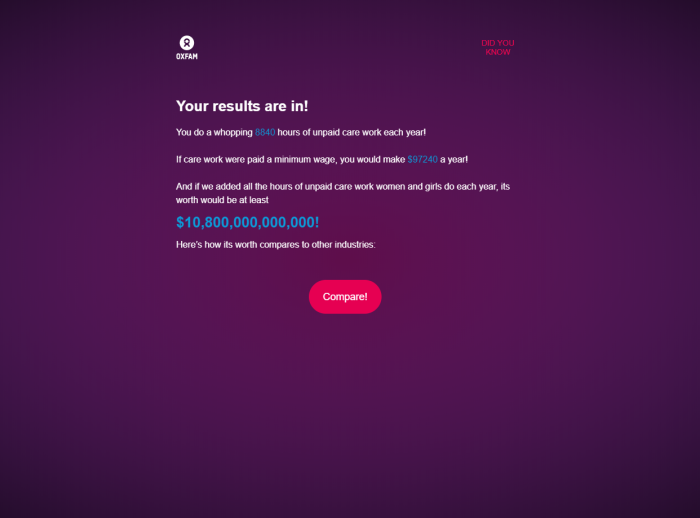- 3 min read
- Published: 22nd January 2020
Global Care Calculator: How the numbers are stacked against women and girls
Joanne O’Connor is Content Executive for Oxfam Ireland – here she recounts her eye-opening results from using the Global Care Calculator.
This week, our Time to Care inequality report made one thing clear: across the world, women and girls make our economies thrive but the vital care work they do often goes unrecognised and unrewarded. That they are responsible for more than three-quarters of unpaid work globally, clocking up a staggering 12.5 billion hours of unpaid work every day, came as a shock for many.
That surprised me. Don’t we all know women who work tirelessly in the home or juggle family life with a career or other responsibilities?
In countries where Oxfam works, the women who cook, clean and care for their family also walk for miles to collect basics like water and firewood. All this hard work goes unrewarded and can trap women and girls in a cycle of poverty. Pursuing an education or a paid job is a pipe dream.

I know how lucky I am. I have a job which pays a salary. I don’t have to collect water from a contaminated stream or risk my safety while searching for firewood miles from home. But I do cook, clean and care for my family every day – and all those hours of unpaid care work add up.
In Ireland, women put in 38 million hours of unpaid care work every week. If women received a living wage for this work, it would cost the State approximately €24 billion. On Monday, after Oxfam’s report was released, I decided to use the Global Care Calculator to calculate how much my care work is worth – how much my second job of caring for my family and all the housework that comes with it contributes. The figure was somewhere in the region of $63,000 a year – or almost €57,000 for about 5,700 hours’ work.
I was stunned. It had to be a mistake. So, I did it again and gave my answers more consideration. (Disclaimer: it’s difficult to quantify, as the calculator asks, how many hours you spend ‘caring for and organising activities for children or others who depend on you’ or providing ‘emotional support for people who depend on you’. It begs the question: is it possible to clock off once your child has gone to bed? Or does comforting your child after a 4am nightmare count as overtime?)
The second attempt would be more accurate, I decided. When the results came in, the total value of the ‘additional’ hours I worked was an even bigger eye-opener. This time, I ‘made’over $97,000 (over €87,000) for 8,840 hours.

Now than I know the value of my unpaid work, I’ll be watching closely the upcoming Citizens’ Assembly which will discuss issues around care and gender inequality. In the run-up to the Assembly, Oxfam Ireland is calling for changes to social employment policies that support carers as well as proper scrutiny of the impact that economic and taxation polices have on women and girls. We want to see more paid shared parental leave or reforms to the pension system that would mean that women don’t miss out if they have to leave the work force to care for a loved one. Ireland desperately needs high-quality care services, resourced by care staff that are paid a living wage.
Otherwise, the notion of who cares wins remains the stuff of fiction.
Joanne O’Connor is the Content Executive for Oxfam Ireland.
